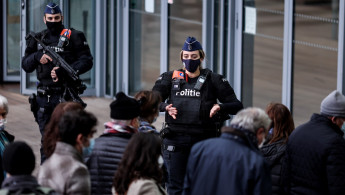Iran diplomat refuses to appear at bomb plot trial
An Iranian diplomat went on trial in Belgium on Friday accused of plotting to bomb an Iranian opposition rally outside Paris, in a case that has stoked tensions with Tehran.
Assadollah Assadi, formerly based in Vienna, faces a 20-year prison term if convicted of being behind the attack thwarted in June 2018.
Assadi, 48, refused to appear in the dock, claiming immunity but, as he was arrested in Germany and his diplomatic accreditation was in Austria, Belgian prosecutors believe they have the right to proceed.
The trial was to continue with the lawyer, Dimitri de Beco, representing his client.
Three others are on trial: a Belgian-Iranian couple, Nasimeh Naami, 36, and Amir Saadouni, 40, accused of taking the bomb from him to plant at the opposition gathering; and Mehrdad Arefani, 57, a Belgium-based Iranian poet allegedly in frequent telephone contact with Assadi.
The three co-accused all appeared in court. They, too, face up to 20 years behind bars if found guilty.
All four are charged with attempting to carry out a terrorist attack and taking part in the activity of a terrorist group.
The case shines an uncomfortable light on Tehran's international activities just as it hopes for a thaw in relations with the West as US President Donald Trump, who pulled Washington out of the Iran nuclear deal, is due to leave office.
In June 2018, Belgian authorities thwarted what they said was an attempt to smuggle explosives to France to attack a meeting of one of Iran's exiled opposition movements which was attended by close Trump allies.
Later that year, the French government accused Iran's intelligence service of being behind the operation, a charge the Islamic republic has furiously denied.
The National Council of Resistance in Iran (NCRI), which includes the People's Mojahedin of Iran or (MEK), organised its rally in Villepinte outside Paris for June 30, 2018.
Several well-known international figures -- including Trump lawyer Rudy Giuliani and former British officials as well as Franco-Colombian former senator Ingrid Betancourt -- and NCRI leader Maryam Rajavi were to attend.
Explosives in car
The day of the rally, Belgian police intercepted Naami and Saadouni driving from Antwerp with half a kilo of TATP explosives and a detonator in their car.
Assadi was arrested while he was travelling through Germany where he had no immunity from prosecution, being outside the country of his diplomatic posting.
Arefani, who had lived in Belgium for more than a decade, was arrested in France in 2018 after Belgium issued a European arrest warrant.
"We can't imagine the scale of the disaster averted," said lawyer Georges-Henri Beauthier, representing the NCRI, along with French colleague William Bourdon.
Outside the court, Bourdon declared: "It's an unprecedented, historic trial. It's the first time that, symbolically, the mullahs' regime is in the dock and will be judged through the case against its so-called diplomats."
'Absolutely furious'
Counsel representing those targeted by the alleged attack say Arefani was close to Assadi, said to be the architect of the plot, and point to an Austrian SIM card found in his possession.
The two men deny any connection.
De Beco, Assadi's lawyer, has accused the civil plaintiffs of trying to turn the case into a political trial on behalf of the opposition movement.
According to Iran expert Francois Nicoullaud -- a former French ambassador to Tehran -- Iran's President Hassan Rouhani was surprised to learn about the failed attack.
"Visiting Europe at the time, he was absolutely furious to learn about this intelligence service operation, on which he hadn't been consulted," the diplomat told AFP.
At the time of the alleged plot, Rouhani was trying to maintain the support of European capitals for the 2015 Iran nuclear deal, which was abandoned by the Trump administration but remains on life-support as European capitals try to keep Iran on board.
When Paris pointed the finger at Iranian intelligence, an Iranian spokesman voiced denial and alleged that opponents of the deal in "certain quarters" were attempting to frame Tehran.
Iran maintains Assadi's arrest was illegal and he should be protected by diplomatic immunity.
The trial is scheduled to take two days, Friday and then Thursday next week. The court is then expected to adjourn to consider its verdict before ruling early next year.
Follow us on Facebook, Twitter and Instagram to stay connected





 Follow the Middle East's top stories in English at The New Arab on Google News
Follow the Middle East's top stories in English at The New Arab on Google News


